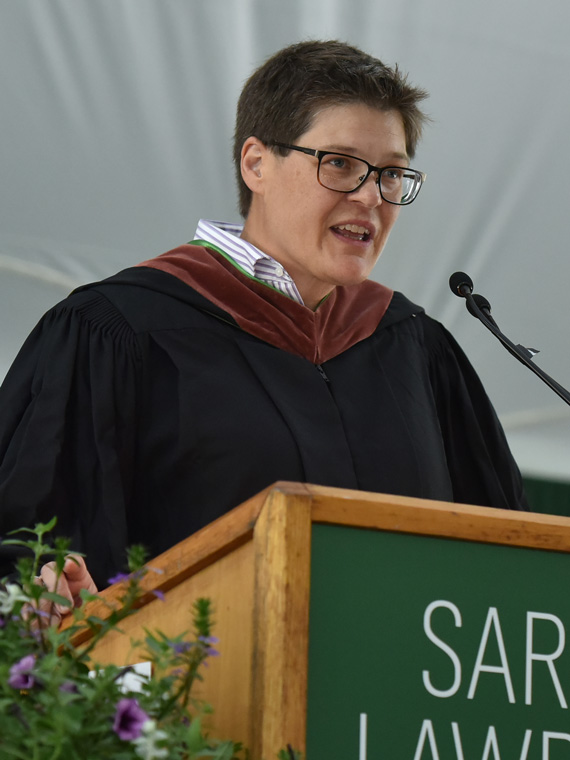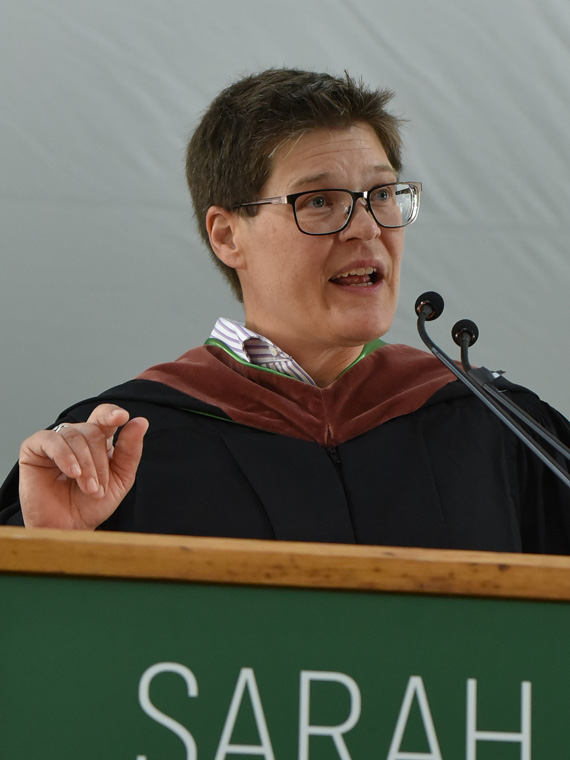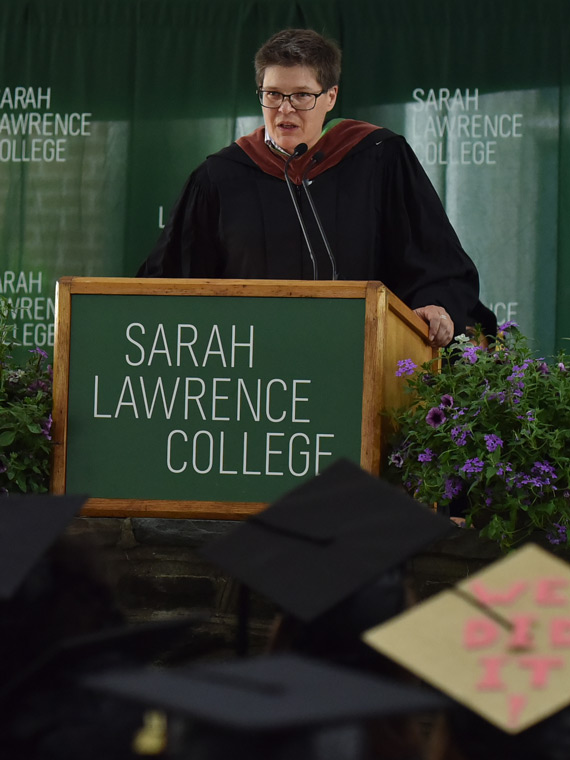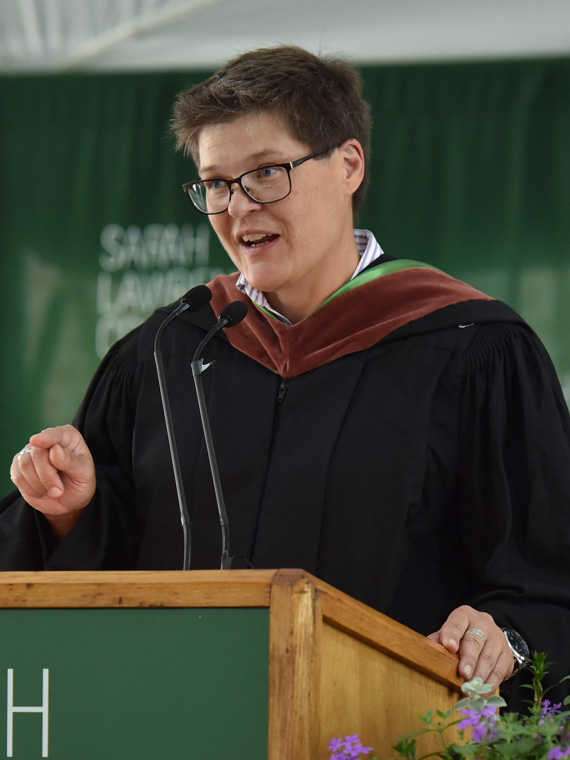Introductory Remarks from President Cristle Collins Judd
It is now my pleasure to introduce today’s guest speaker. Kyes Stevens is an activist. She’s a poet. An animal rescuer. A volunteer. And—in case you couldn’t guess by those varied areas of interest and action—she’s a Sarah Lawrence alumna. A two time Sarah Lawrence alumna, in fact!
A native of Waverly, Alabama, Kyes earned her MA in Women’s History and her MFA in Poetry from Sarah Lawrence, and today combines those two passions as the founder and director of the Alabama Prison Arts + Education Project at Auburn University, an organization dedicated to bringing educational opportunities to prisoners throughout Alabama. With its earliest roots in 2003, today the project serves 10 of Alabama’s 15 major prisons through pre-college and college programs, and has led to the first Bachelor of Science degree program for the Alabama prison system.
A leader in criminal justice reform through education, Kyes has worked with colleagues across the country to build the foundation for the National Alliance for Higher Education in Prison, and has been involved in the development of a national organization to support artists who teach in corrections. With colleagues from around the country, she met several times with members of the Obama administration at the White House to discuss the role of higher education in criminal justice reform.
Today marks the second time this semester that Kyes has spoken on campus. In February, she spoke as part of our yearlong series of events exploring our inaugural theme, Democracy and Education. As someone whose work is so fundamental to democracy, so focused on creating equal opportunity through education, and so timely in our world today, one day was not enough. Please join me in welcoming Kyes Stevens to the podium, and back to Sarah Lawrence.
Kyes Stevens MA ’99, MFA ’00
Founder, Alabama Prison Arts + Education Project
Hello, and good afternoon. It sure is nice to see you, everyone looking so excited, and also hoping that I don’t drone on and on…
It is a real honor to be here today to speak with you. Thank you, President Cristle Collins Judd for inviting me back.
 It is a homecoming, no doubt—this college’s influence on how I’ve built this life is significant. Curiosity, action, and cultivating a habit of hard work. The women’s history program taught me that I could do more than I ever imagined academically. And the poetry program, well, that was like putting Miracle Grow on my already wide open eyes.
It is a homecoming, no doubt—this college’s influence on how I’ve built this life is significant. Curiosity, action, and cultivating a habit of hard work. The women’s history program taught me that I could do more than I ever imagined academically. And the poetry program, well, that was like putting Miracle Grow on my already wide open eyes.
Eighteen years ago I stood right here and spoke to my peers, my teachers, and families. Then, as now, I am full of gratitude for all the people along the way who invested in me. A simple reminder that we do not get anywhere all on our own. That whole boot-strap logic is broken.
I don’t know hard and fast answers to things, so to start, here in this liminal space, a question:
What does it mean to walk with intention and action through the world bound by compassionate sight?
I am going to say that again:
What does it mean to walk with intention and action through the world bound by compassionate sight?
In 1987, my mother gave me short story The Man Who Planted Trees. Without hesitation, one of the most influential readings of my youth. Now, I read it at least once a year—some kind of soul scripture. I’ve needed it spending the last 17 years teaching in prisons, which has challenged me to see anew.
I stepped into teaching poetry quite full of myself, thinking that I was the shizzle. I found out very quickly I was in fact, not the shizzle. Prison taught me that. It taught me about inequity and access, and how poverty and racism endure. I am grateful for that insight.
So, this story, The Man Who Planted Trees—it is “just” one of an ordinary man who saw potential in a vast desert. He began to plant trees. For a lifetime. A forest grew. People were amazed. People doubted. But, Elzeard Bouffier, the shepherd, the simple man, did not doubt. He did not waiver at all. He had a deep, unshakable knowing.
It is a story about environmental impact—of course—about being active stewards of the land. But the metaphor interests me, too. It is one of cultivating and growing any kind of change. It is a story of lifelong investment. It is having faith in something. It is enduring when people and systems minimally support or even try to derail a truth, an action. It has a certain selflessness, but also rooted in feeding the soul of the self. It is an steadfast action based in compassion.
It begins with the ability to see the present, but also to see endlessly beyond. It is the on-the-ground view—to see a vast space where trees could grow, and also the 20,000 foot view—of what comes when there is a forest, how from something that seemed like a wasteland, a whole new ecosystem emerges.
This is how to create cultural and institutional change. To see today, and to imagine five generations from now. To believe in more than you can know. And to act on that belief.
I tell my students that once we truly learn to see, with an openness of head and heart, we cannot unsee.
 With sight, comes great obligation. And maybe that is why there is a such systemic fear in our culture, a societal induced blindness—of things that are other. We judge people—and I am not just talking about people who are impacted by the criminal justice system—it’s everyone—even comedy is a thinly veiled diminishment, usually pointed at a human or a group of humans. How hard we are on each other.
With sight, comes great obligation. And maybe that is why there is a such systemic fear in our culture, a societal induced blindness—of things that are other. We judge people—and I am not just talking about people who are impacted by the criminal justice system—it’s everyone—even comedy is a thinly veiled diminishment, usually pointed at a human or a group of humans. How hard we are on each other.
This world puts opportunity in our path—there are lights on the way. But if the glimmer is around the bend, if it seems stifled by the shadow of an old oak tree, or a building, or even an idea, look harder. Dream new ways to get to the light.
Don’t be complicit in the mundane. The mundane is a world and mind with blinders on. Try and find what you cannot see. Break things open in order to discover the realness inside.
Last week, the cyclical nature of being manifested when I had the chance to spend a few days with Suzanne Gardinier, who came down to Alabama to be with some poets on the inside. Many of you know her here. I certainly do. She was my professor. Long the advocate of radical sight and challenging students to conceive of something greater, Suzanne planted seeds in me.
Seeds regenerate, they grow on in lives that are poems.
All this to say, you never know what seeds are going to sprout, and when, so nurture consciousness, be aware of yourself in the world.
Walt Whitman spoke to this in the preface to Leaves of Grass:
“This is what you shall do; Love the earth and sun and the animals, despise riches, give alms to every one that asks, stand up for the stupid and crazy, devote your income and labor to others, hate tyrants, argue not concerning God, have patience and indulgence toward the people, take off your hat to nothing known or unknown or to any man or number of men, go freely with powerful uneducated persons and with the young and with the mothers of families, read these leaves in the open air every season of every year of your life, re-examine all you have been told at school or church or in any book, dismiss whatever insults your own soul, and your very flesh shall be a great poem and have the richest fluency not only in its words but in the silent lines of its lips and face and between the lashes of your eyes and in every motion and joint of your body.”
He was an absolute visionary, right?
Your very flesh will become a great poem, the physical self a vessel for truth telling, for calling in the elders, for bringing in the voices and the history, to make change. To be change. Poetry is change. It is of the people. It is Langston Hughes calling on Alabama:
When I get to be a composer
I'm gonna write me some music about
Daybreak in Alabama
And I'm gonna put the purtiest songs in it
Rising out of the ground like a swamp mist
And falling out of heaven like soft dew.
I'm gonna put some tall tall trees in it
And the scent of pine needles
And the smell of red clay after rain
And long red necks
And poppy colored faces
And big brown arms
And the field daisy eyes
Of black and white black white black people
And I'm gonna put white hands
And black hands and brown and yellow hands
And red clay earth hands in it
Touching everybody with kind fingers
And touching each other natural as dew
In that dawn of music when I
Get to be a composer
And write about daybreak
In Alabama.
To find answers, you must look for the light of questions. You must vision the world you want, and then act. Look to the periphery—where people are forgotten, dismissed. There is so much beauty in being there—in the outer edges. Ask the questions. They need answers. Who deserves possibility? Who deserves potential? What desert gets the seeds? Does a single person’s heart and soul hold more light and value and vision than another? If so, why?
 We have entrenched systems that perpetuate a discriminatory process for planting—literally and figuratively. Who gets access to what? Systems are hard to change, and let’s be honest, most of these systems are based on exploitation and profit-making, and they are going to be colossally difficult to dismantle.
We have entrenched systems that perpetuate a discriminatory process for planting—literally and figuratively. Who gets access to what? Systems are hard to change, and let’s be honest, most of these systems are based on exploitation and profit-making, and they are going to be colossally difficult to dismantle.
So—my challenge to you: build your own system—your own standard by which to see, and live and invest in the planet—and its vast complexity.
To grow this way of being and doing, nourish your sight—you must look at everything. Do not inhabit intentional blindness because you do not like something, or you do not agree with. See your flaws—I promise, you have them. Know them. They can help you evolve.
Don’t be fooled into thinking because you are great and wonderful that everyone is going to jump on board with your system—it does not work that way, so do yourself a favor and don’t expect it.
Don’t believe that yours is the best system in the whole wide world, or the only system. That is where ego gets in the way, a thought process of entrenchment that inherently excludes other voices and visions.
Have faith in yourself, but consider making your existence about more than you.
Many of you might know exactly what you want to do. Others, you might have no clue. Both of those are just fine. Because when you step wide into the world, with eyes that can see possibility—for people, for justice, for the planet, for animals, whatever it is, you will see there are all kinds of avenues waiting for your particular heart—your particular mind.
In learning to see though, don’t step into the damaging hierarchical structures that are eating this country alive. Don’t step into greed, don’t succumb to power sucking modes of being that oppress others, please do not place your sight above someone else’s.
I live in rural Alabama. I am surrounded by sights that are not my own, values and beliefs that are seemingly not even of the same world. But it IS in my world. We have to make space for that. I have to make space for that.
The person who disagrees most vehemently with what I do with the Alabama Prison Arts + Education Project has a reason for their reaction. There is a personal experience, there is anger and fear, misconceptions, unknowing, and there is still racism. But, I believe unwaveringly in the capacity of human beings to flourish through arts and humanities, through access to meaningful education. All human beings. Every single one, no matter race, age, location, personal beliefs, personal action—I believe it is a human right. And guess what, nothing will change that.
So, as I hope that people listen to me, then I must listen. REALLY listen—focus on the person. This is not always easy—but so much fear and hatred and judgment and othering is based on a society full of people who won’t soulfully listen to each other. If you only surround yourself with people who agree with you, you are not going to grow much. Listening and seeing allows space for building possibility.
 One of my mechanisms for conceptualizing possibility is getting as far away from human beings as possible—for me, the backcountry wilds and mountain tops of New Zealand. Get somewhere quiet. Turn off the damn phone and get away from technology—and see. See the rustle of grasses on the edge of a sandy beach and the way that the pines have grown to catch the wind, rather than fight it off. Get to the spot where a stream or river starts—see that it is a trickle. It is not torrent at its birth spot. Watch the moon and the stars. Get to darkness, so you can understand light.
One of my mechanisms for conceptualizing possibility is getting as far away from human beings as possible—for me, the backcountry wilds and mountain tops of New Zealand. Get somewhere quiet. Turn off the damn phone and get away from technology—and see. See the rustle of grasses on the edge of a sandy beach and the way that the pines have grown to catch the wind, rather than fight it off. Get to the spot where a stream or river starts—see that it is a trickle. It is not torrent at its birth spot. Watch the moon and the stars. Get to darkness, so you can understand light.
Don’t let fear get in the way of your heart. In this country, all across, in every corner, there are people building toward the world they believe in, that they value. Not everyone is going to like your world. That is OK. Just keep going.
Act with intention, with a sight that is cultivated by compassion. A sight inspired by possibility.
And in closing, please, offer out your hand to the world. It will take work and time and money and energy and heart and head. And you will not regret it.
Remarks as prepared for delivery